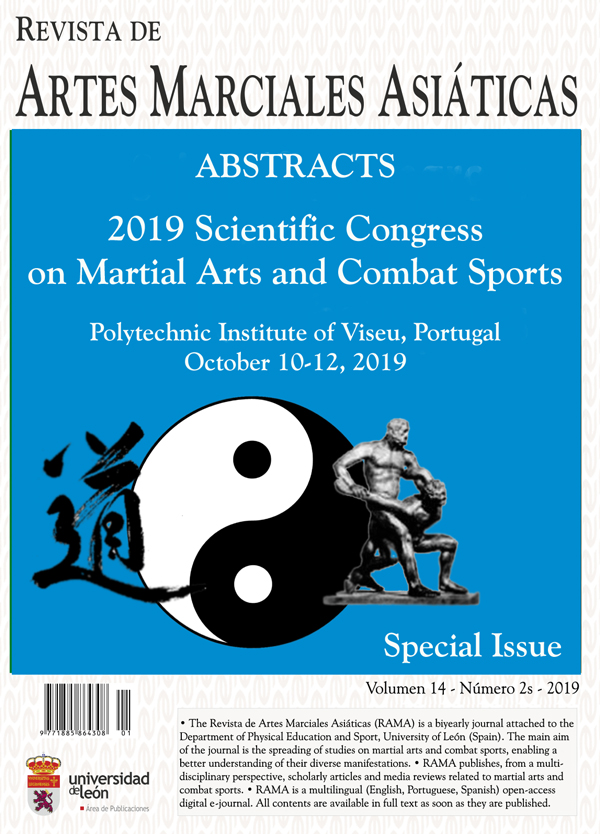ITF Taekwon-Do pedagogy in North Korea: A case study
DOI:
https://doi.org/10.18002/rama.v14i2s.6017Palabras clave:
Martial arts, combat sports, taekwondo, musul, muyae, mudo, International Taekwon-Do Federation, behavioral-rational curriculumResumen
Background. Despite the style of Taekwon-Do taught by the International Taekwon-Do Federation (ITF) being founded in the Republic of Korea (ROK; South Korea), it is known predominately as “North Korean Taekwon-Do.” Problem and Aim. Taekwon-Do was introduced to the People’s Democratic Republic of Korea (DPRK; North Korea) in 1980, but since then no studies have reported how it is practiced in that country due to the DPRK government’s restricting access to its populace. This research aims to begin establishing if there are differences in pedagogical purpose and praxis in DPRK Taekwon-Do. Methodology. An internet search for individuals who traveled to the DPRK to practice Taekwon-Do specifically was conducted. A systematic literature of ITF pedagogical materials was performed, and a multipurpose, qualitative questionnaire was implemented. Out of the seven individuals who were identified and contacted, two agreed to participate in the current study; however, one of those two were disqualified due to incorrectly completing the questionnaire. A descriptive, non-experimental case study of one subject (Singaporean female aged 36 yr.) was then conducted. A qualitative analysis of the data resulting from the questionnaire and follow-up interviews was performed. Results. All five areas of the ITF’s curriculum (i.e., fundamental techniques, tul [forms], sparring, dallyon [forging or conditioning of the body], and self-defense) and the three levels of Taekwon-do’s pedagogy (i.e., musul [martial technique], muyae [martial artistry], and mudo [martial way]) were found in DPRK Taekwon-Do. Discussion and Conclusions. Despite the severe limitations of being unable to interview DPRK Taekwon-Do practitioners directly and the smallest small sample group possible, it was learned that DPRK instructors most likely teach all aspects of General Choi’s Composition of Taekwon-Do, and the stratified Taekwon-Do pedagogy theory was found in the subject’s practice in the DPRK.
Descargas
Métricas alternativas
Citas
Armour, K. (2011). What is ‘sport pedagogy” and why study it? In K. Armour (Ed.), Sport pedagogy: An introduction for teaching and coaching (pp. 11-23). New York, NY: Routledge.
Capener, S. (2005). The modern significance of taekwondo as sport and martial art: Over-coming cultural and historical limitations in traditional thinking. Korean Thought and Culture, 30, 321-354.
Choi, H. H. (1985). Encyclopedia of Taekwon-Do, Vol. 1. Toronto, Canada: International Taekwon-Do Federation.
Cynarski W.J., & Swider P. (2017). The journey to the cradle of martial arts: A case study of martial arts’ tourism. Ido Movement for Culture. Journal of Martial Arts Anthropology, 17(2), 24-32; doi: https://doi.org/10.14589/ido.17.2.3
Johnson, J. A. (2017). From technique to way: An investigation into taekwondo’s pedagogical process. Ido Movement for Culture. Journal of Martial Arts Anthropology, 17(4), 3-13. doi: https://doi.org/10.14589/ido.17.4.2
Johnson, J. A. (2019). Taekwondo and peace: How a killing art became a soft diplomacy vehicle for peace. International Journal of the History of Sport, online version, 1-26. doi: https://doi.org/10.1080/09523367.2019.1618838
Kim, S. S., Timothy, D. J., & Han, H. C. (2007). Tourism and political ideologies: A case of tourism in North Korea. Tourism Management, 28(4), 1031-1043. doi: https://doi.org/10.1016/j.tourman.2006.08.005
Li, F. S., & Ryan C. (2018). Souvenir shopping experiences: A case study of Chinese tourists in North Korea. Tourism Management, 64, 142-153. doi: https://doi.org/10.1016/j.tourman.2017.08.006
Descargas
Publicado
Cómo citar
Número
Sección
Licencia
Derechos de autor 2019 John A. Johnson

Esta obra está bajo una licencia internacional Creative Commons Atribución-NoComercial-CompartirIgual 4.0.
Los autores que publican en esta revista están de acuerdo con los siguientes términos:
- Los autores ceden de forma no exclusiva los derechos de explotación (reproducción, distribución, comunicación pública, transformación) a la Universidad de León, por lo que pueden establecer, por separado, acuerdos adicionales para la distribución no exclusiva de la versión de la obra publicada en la revista (por ejemplo, alojarlo en un repositorio institucional o publicarlo en un libro), con un reconocimiento de su publicación inicial en esta revista.
- Este trabajo se encuentra bajo la Creative Commons Attribution-NonCommercial-ShareAlike 4.0 International License. Puede consultarse desde aquí la versión informativa y el texto legal de la licencia.
- Se permite y se anima a los autores a difundir electrónicamente las versiones pre-print (versión antes de ser evaluada) y/o post-print (versión evaluada y aceptada para su publicación) de sus obras antes de su publicación, ya que favorece su circulación y difusión más temprana y con ello un posible aumento en su citación y alcance entre la comunidad académica.











